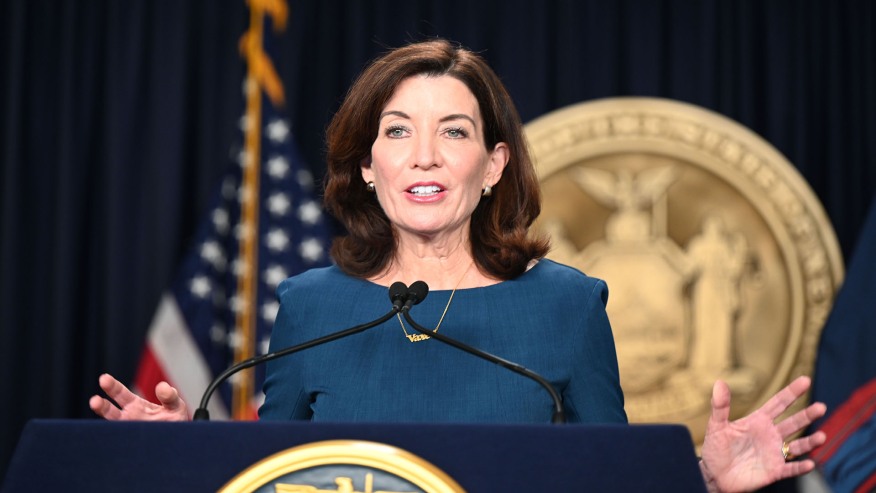
A new initiative will give New York state residents with previous marijuana-related offenses priority in cannabis dispensary licensing.
New York State Gov. Kathy Hochul announced the Office of Cannabis Management’s (OCM) Seeding Opportunity Initiative on March 10. Through the initiative, “equity-entrepreneur” applicants with previous cannabis-related offenses and experience owning and operating a qualifying business will be eligible to receive conditional adult-use retail dispensary licenses. Qualifying applicants must have a cannabis-related offense from before the passage of the Marijuana Regulation and Taxation Act (MRTA), or have relatives or dependents with a pre-MRTA cannabis offense in New York state.
The intent of the Seeding Opportunity Initiative is to put these applicants at the “front-end of the adult-use market,” according to Hochul’s announcement. One hundred or more of the first marijuana retail licenses will be granted to those with marijuana convictions, or those with family members who have marijuana convictions.
“New York state is making history, launching a first-of-its-kind approach to the cannabis industry that takes a major step forward in righting the wrongs of the past,” Hochul said in the announcement. “The regulations advanced by the Cannabis Control Board today will prioritize local farmers and entrepreneurs, creating jobs and opportunity for communities that have been left out and left behind.”
Less than a month prior, Hochul had also signed the Conditional Cannabis Cultivation Bill, a related piece of legislation which provided opportunities for hemp farmers to grow cannabis starting in spring 2022, according to Hochul’s announcement. On Thursday, 52 of the new Adult-use Cannabis Conditional Cultivator Licenses were granted, as part of the attempt to provide current hemp farmers with a head start on marijuana farming to meet the new industry’s demand.
Damien Cornwell, owner of Just Breathe., a local cannabis shop in Binghamton, and director of operations for the Broome County Urban League — a nonprofit that assists disadvantaged people in achieving economic self-reliance — along with his fiance, Sarah Hogan, the scheduling and store manager at Just Breathe., said they supported both initiatives.
“I don’t know what Gov. Hochul’s overall intent is, but look, it’s a start,” Hogan said. “It’s a start that’s allowing us to bridge gaps and so we support it.”
Cornwell and Hogan said dispensaries can contribute to their communities in numerous ways, such as through a roundtable they had hosted at Just Breathe. The event had included government and community “movers and shakers” like local business owners and residents, Broome County Executive Jason Garnar, Jennifer Lesko, the CEO of the Broome County Urban League and Carly Norton, Hochul’s Southern Tier regional representative.
Cornwell said he had provided support to initiatives similar to Hochul’s in the past.
“I also do a lot of work with the [Broome County] Urban League and I helped write one of the workforce development grants that, in part, dealt with expungement services and helping people get their records concealed that had been formerly incarcerated due to a nonviolent drug charge,” Cornwell said. “And the reason why it tied into the workforce was because we had a hard time getting employment a lot of times for people whose records weren’t concealed.”
The workforce development grant had helped around 23 people get their records concealed and 60 people find jobs, according to Cornwell.
Hogan said that while the Seeding Opportunity Initiative is a start, there is still more to be done.
“If someone from the top who has the power to make this decision can, they should say, ‘Alright, let’s try to level the playing field a little bit,’” Hogan said. “Does it completely level the playing field? No, there’s a million things that we could do to level the playing field, but that’s going to take a lot of time. But with regard to this specific bill, that initiative, I believe it absolutely needs to be there. It aligns with what our vision is.”
A poll conducted in late March by Siena College, however, indicated that the majority of New York state voters, or 54 percent, opposed the initiative, with 33 percent of voters in support. Support for the initiative was largely divided across certain demographic boundaries, with voters who are white, Republican, independent and not from New York City more likely to oppose the initiative, and voters who are Black and Latino strongly in support.
One student, who wished to remain anonymous, said they have sold marijuana before and that it was important to reimburse those with convictions for selling marijuana.
“They did run a business, it was just a personal one without all the official stuff,” the student said. “And I think offering it to them first is a good idea because when you’re convicted of things, it is so hard to find employment. So giving them the power back for something they were convicted of that’s now legal feels obvious. It’s reparations for taking away from their livelihood in the first place, for however long they spent in prison, for something that’s now legal.”


